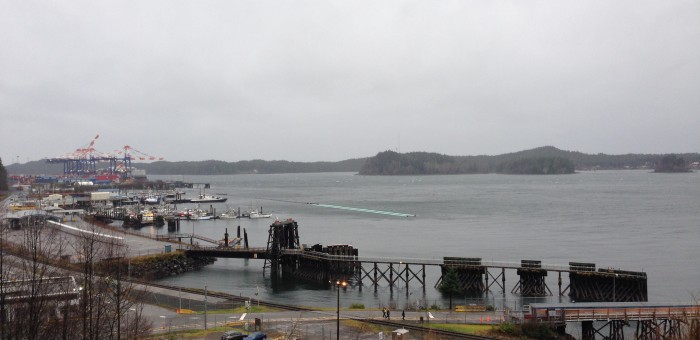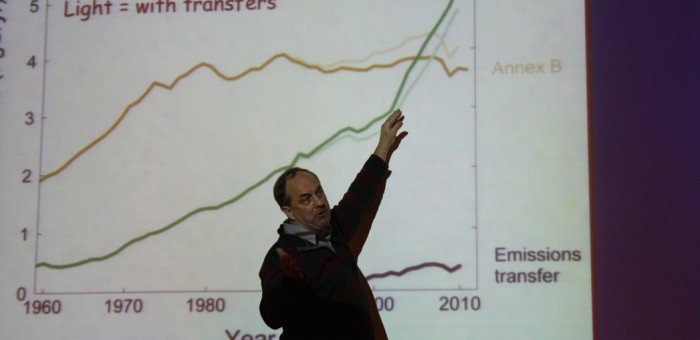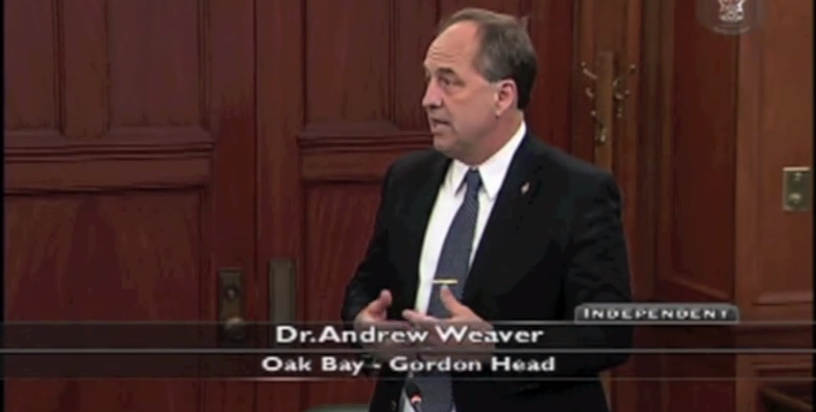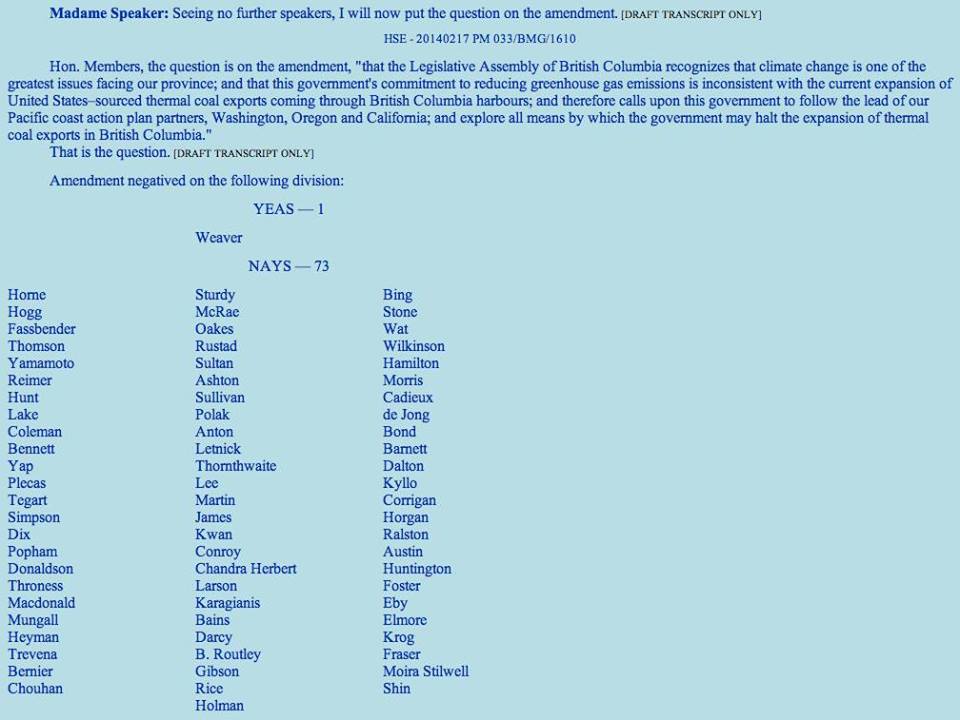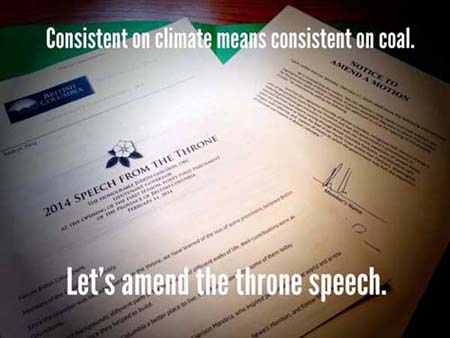Coal
A new poll on expanding coal exports through British Columbia ports
Thank you to everyone who participated in our first polling question using PoliSourceBC. The final results of the poll are listed below. Our next poll touches on an issue that I have written extensively about on this site (type coal into the search bar above for a list of articles).
“Burning thermal coal to produce electricity is the world’s biggest single source of greenhouse gas emissions. Washington, Oregon and California States are taking steps to halt the expansion of thermal coal exports through their ports. Do you believe that BC should take similar steps to halt the expansion of thermal coal exports through its ports?”
To participate in this poll please click here.
RESULTS OF PREVIOUS POLL
“Do you support the Green Party of BC policy to add a 6th condition for the approval of resource development applications? Condition #6 would be: No diluted bitumen in tanks on BC coastal waters.”
The poll ran from March 4 to March 24, 2014 and there were 273 responses as follows:
- Yes – 237 (87%)
- No – 27 (10%)
- Other – 9 (3%)
Approximately 20% of the responses were from constituents, according to postal code data.
What Leadership Looks Like on Thermal Coal Exports
By 2016, B.C. will have doubled its thermal coal exports. Thermal coal is largely sourced from outside of British Columbia and contributes very little to B.C. jobs. It is also one of the single largest contributors to global carbon emissions. In fact, the increase in B.C.’s thermal coal exports that we will see in the next two years alone will produce more carbon emissions than our entire province will in 2020, assuming we meet our legislated climate targets.
Last fall, the BC government joined the Pacific Coast Action Plan on Climate and Energy. Together with Washington, Oregon, and California, we committed to building a strategic alignment to combat climate change and promote clean energy. Our partners understand the threat of thermal coal and have taken practical steps to reduce their thermal coal exports. It’s time B.C. did the same.
State Leadership on a National Issue
Recognizing that they have limited power within their jurisdiction the leaders of California, Oregon and Washington are putting pressure on the American federal government to halt the expansion of coal exports. For instance, the Governors of Oregon and Washington have pressured the Obama administration to review the impact that leasing and exporting western coal has on climate change. A letter signed by both governors states: “We cannot seriously take the position in international and national policymaking that we are a leader in controlling greenhouse gas emissions without also examining how we will use and price the world’s largest proven coal reserves.” Furthermore the governors believe that “the decisions to continue and expand coal leasing from federal lands and authorize the export of that coal are likely to lead to long-term investments in coal generation in Asia, with air quality and climate impacts in the United States that dwarf those of almost any other action the federal government could take in the foreseeable future”.
Similarly, in 2012, the Assembly and Senate of the State of California passed a resolution urging the American President and Congress to “enact legislation to restrict the transshipment for waterborne export of coal for electricity generation to any nation that fails to adopt rules and regulations on the emissions of greenhouse gases”. This resolution easily passed in California.
Practical Steps that Make a Difference
Meanwhile, these states are also taking practical steps within their jurisdiction to halt the expansion of coal exports. For example, a few weeks ago the Port of Oakland board of commissioners in California unanimously rejected two proposals that would have seen the construction of a new coal export facility, citing environmental concerns, public health hazards, economic pitfalls, and public opposition. This is the most recent rejection of proposed coal export facilities on the west coast; three other coal export facilities have been rejected in Oregon and Washington over the last two years.
Another great example of leadership is found in Washington. There the Department of Ecology is now requiring, as part of its environmental impact statement on the proposed Gateway Pacific Terminal (a massive coal export facility), “an evaluation of impacts associated with the project from greenhouse gas emissions including those from terminal construction, terminal operation, rail and vessel traffic, and also the end-use coal combustion”. This is a holistic approach to environmental assessments as it recognizes that building the coal-export facility does not only have local environmental impacts but will also facilitate the increased use of burning coal in Asia, and thus increase the emissions going into our global atmosphere.
It’s Time for B.C. to Step Up
Elected officials in these U.S. states clearly understand the threat thermal coal poses to our climate and they are doing what they can to respond. Our provincial government could do the same. Instead we remain the only administration in this partnership that has not spoken out against the export of thermal coal. In fact, when I proposed a motion in February to limit the expansion of U.S.-sourced thermal coal exports it was voted down 73 to 1. This is shameful.
Exporting increased amounts of thermal coal is a direct threat to the progress we have made on addressing climate change. Local and state leaders in California, Oregon, and Washington recognize that exporting coal to be burned in Asia undermines their attempts to reduce their own emissions. The same is true for B.C. It’s time we follow their leadership and stop the expansion of thermal coal exports.
To understand more about how BC ports are expanding their coal-export operations and why I am opposed, please read my three previous blogs on the issue, found here, here and here.
If you are interested in my motion to reduce the expansion of thermal coal exports, you can read my speech here.
What the Provincial Government can do to Impede Thermal Coal Exports
Thermal coal is being increasingly shipped out of BC ports. The vast majority of this thermal coal originates in mines outside of our province: primarily in the Powder River Basin in the US and from a few mines in Alberta. American mining companies such as Cloud Peak Energy, Arch Coal, and Peabody Energy, are attempting to get their product to Asian markets and are desperate to do so as US power plants have increasingly displaced coal with natural gas. Facing stiff opposition from increasing coal exports through Washington, Oregon, and California, these companies have shifted their attention to BC.
The shipping of this thermal coal is completely inconsistent with BC’s climate strategy and yet the provincial government has done nothing to impede it. In fact it seems like the opposite is true, BC, it appears, is open for business.
While it is true that the operation of Port Authorities (and any expansions) falls under federal jurisdiction there are significant opportunities for the province to step in and take an active role in opposing the expansion of thermal coal exports.
The most controversial coal expansion project is currently the Fraser Surrey Docks Terminal Expansion. Using this example, the province could undertake a number of initiatives:
- Texada Quarries has applied for a permit amendment to increase their Coal Storage limit and this is a key link in the Fraser Surrey Docks proposal. The permit amendment process runs through the ministry of Energy and Mines. Under both the Mine Act and the Environment Management Act this permit could be refused because of concerns around Health and Environmental Impacts. As part of its permitting process the province could also call for a Health Impact Assessment and Environmental Impact Assessment as a prior condition to granting the amendment.
- The Minister of Health could order a Health Impact Assessment being called for by both the Local Medical Health Officers and the Provincial Health Officer with the Fraser Surry Docks Terminal Expansion.
- The Ministry of Environment could also order its own comprehensive Environmental Impact Assessment, as opposed to the one that was commissioned by FSD that has received heavy criticism.
Clearly the province has powers that could delay, impede and derail this specific expansion. For a province that claims to be a leader in climate change action, the expansion of thermal coal exports through our ports is deeply hypocritical. Significant opposition around this project exists. Municipal councils, health officials, school boards, environmental groups and concerned citizens have all voiced their opposition to a project that does little to benefit our province yet showcases the hypocrisy of the BC Liberal position on climate change.
In comparison, our southern neighbors take climate change seriously when considering new projects. For example, in Washington, as part of its Environmental Assessment (EA) for the Gateway Pacific Coal Port project, the Department of Ecology is actively considering the impacts climate change in its assessment. The EA includes an analysis of greenhouse gas emissions associated with the project site and construction, transportation from mine to market, and the end-use burning of exported coal in Asia!
The government claims that jumping head-first into the race on LNG is the single best thing that the province can do to address climate change. I frankly think that actively opposing the expansion of the dirtiest fuel on the planet would do a lot more.
Putting Climate Targets Back Into the Throne Speech
On the floor of the House Andrew Weaver spoke to his motion to amend the Throne Speech, highlighting the government’s inconsistency in greenhouse gas targets. Under the province’s climate targets the legislated goal is to reduce emissions from the current 62 megatons of carbon pollution to 43 megatons by 2020 and 13 megatons by 2050. Producing liquefied natural gas through five plants would add 73 megatons to current provincial emissions, making our greenhouse gas targets impossible to keep.
The government has stated LNG exports from BC will reduce Asian, especially China’s, dependency on coal fired power generation, therefore reducing their carbon emissions. If we are serious about reducing global emissions then a better plan would be to halt exports of thermal coal through BC. Doing so would have little impact on provincial employment, or revenue, as the vast majority is produced from US mines.
Transcript: Speech from the floor of the House
“With the 2014 Speech from the Throne the British Columbia Government has once again conveyed its goal of creating jobs, controlling spending and building an economy that is not erected on the backs of future generations.
Like the government, I too believe this is possible. In fact, I believe that the long-term economic prosperity of BC will ultimately depend on us meeting this goal. It will depend on our ability to transition our economy to one that meets the needs of today without sacrificing the welfare of future generations.
However, with this belief comes my assertion that we are not yet there — that there is more to be done — a lot more to be done. We need a vision coupled to a concrete plan of action to get us there.
In 2008, we had such a vision for this economy. It manifested itself alongside the Climate Action Plan and with its inception, we as a province set out on a new path. We — British Columbians — led not only our country, but our continent as we found innovative ways to begin the transition to a strong, low-carbon economy.
In 2008 we had a plan to transition ourselves to this economy—one that was grounded in evidence and accountable to clear, measurable targets. The goal was to decrease greenhouse gas emissions by 33% below 2007 levels by 2020. We were on track to achieve this goal. However, under the vision of the current throne speech, I am afraid to say, we will certainly fail.
When I respond to the Budget, I will elaborate on this concern.
Today, however, I would like to focus on the government’s bold assertion that LNG development is “the greatest single step we can take to fight climate change.”
According to the Throne Speech, LNG production could reduce China’s emissions by over 90 megatons per year. Leaving aside the fact that no credible international climate body would offer greenhouse gas reduction credits to a jurisdiction for producing greenhouse gases, let’s still look at the overall numbers.
In 2011 BC emitted 62 megatons of carbon pollution. Our legislated goal is to reduce our provincial emissions to 43 megatons by 2020 and to 13 megatons by 2050.
If LNG is to decrease China’s emissions by 90 megatons per year, we will have to produce it. What this means is that while China could decrease its emissions, we will certainly increase ours. The question is: How much will our own emissions increase and how will this affect our own, provincially legislated climate targets?
According to the Pembina Institute, if we are to meet the government’s revenue projections from LNG, we would need at least 5 LNG plants. These plants would emit roughly 73 megatons of carbon pollution each year. That is nearly double our 2020 target and more than 5 times our 2050 target.
What does this all mean? Selling LNG to China so that it might decrease its carbon emissions means that we in BC will have no choice but to throw our own targets out the window. Forget the laws. Forget the rhetoric. The science says it’s impossible. We will be throwing away the certainty of our own climate targets for the possibility of theirs.
If we are to walk away from leadership—if we are to turn our backs on our climate targets and ignore the laws we set for ourselves—what does that say about our resolve in the face of adversity?
In 2008 we boldly committed to address one of the greatest challenges of our time. In 2014, it would seem we have boldly committed to perpetuate it, if not accentuate it.
Just this past week John Kerry, the US Secretary of State, was in Indonesia where he described global warming as “perhaps the world’s most fearsome weapon of mass destruction”. He further stated, and I quote: “Terrorism, epidemics, poverty, the proliferation of weapons of mass destruction: all challenges that know no borders,” and I quote again “The reality is that climate change ranks right up there with every single one of them.”
As Britain dealt with historical floods across its nation, The Guardian Newspaper celebrated Valentines day with a Front Page Story by Sir Nicholas Stern entitled: “Climate change is here now. It could lead to global conflict. Yet the politicians squabble.”
Floods in Calgary and Britain, record droughts in California and Vancouver Island, record breaking heat and fires in Australia, devastation in the Philippines from typhoon Haiyan and in New York from Hurricane Sandy. The list is growing and the problem is getting more and more serious.
And I reiterate: YET THE POLITICIANS SQUABBLE.
Look around this chamber and ask yourselves what you and your caucuses are doing to address this, the greatest challenge of our time. Are you cheerleaders for the fossil fuel industry and the BC LNG pipedream? Are you so busy playing the game of gotcha politics that you’ve lost touch with the reason why you are here?
Coming back to the LNG plan outlined in the throne speech, there is another issue. If we are to double down on LNG exports and consider them for their impact on reducing global greenhouse gas emissions, what about our other exports that increase global greenhouse gas emissions? Will they be counted as well or will they be conveniently left out of the calculations?
Let me offer just one example: Thermal coal.
Right now BC exports 20 megatons of thermal coal each year. The vast majority of this coal is shipped in from the US and Alberta and does not contribute to BC jobs the way metallurgical coal does. Washington, Oregon and California—our partners in the Pacific Coast Action Plan on Climate and Energy—have so far sad ‘no’ to thermal coal exports. With their export limits in place, American producers are looking for new export ports and so over the next 2 years we will see a 20 megaton increase in thermal coal exports through BC. That’s a total of 40 megatons of thermal coal each year between the existing and proposed expansion of exports.
If we are to boast that LNG exports would be “the greatest single step we can take to fight climate change”—that they could decrease Chinese emissions by 90 megatons each year—then we must also consider how much our other exports increase global carbon emissions.
If we look at reliable, scientific estimates, the 40 megatons of thermal coal we will be exporting will add over 100 megatons of carbon pollution to our atmosphere each year. The fact is, while we could possibly reduce Chinese emissions by 90 megatons, we will certainly increase emissions from coal exports to 100 megatons. Forget 90 megatons in savings—we will have just increased net global emissions by 10 megatons from coal exports alone.
To be clear, I am not suggesting we ban coal exports or in any way limit our metallurgical coal industry. I am talking specifically about the expansion of thermal coal exports that originate outside our province. When those are factored in, the numbers just don’t add up.
I therefore stand today to introduce an amendment to the motion for an Address in Reply to the Speech from the Throne.
I do not introduce this amendment as a matter of confidence in the government. I introduce it as a contribution to the debate about the consistency of the government’s vision of an economy that does not unnecessarily burden future generations.
The current motion stands as:
“We, Her Majesty’s most dutiful and loyal subjects, the Legislative Assembly of British Columbia, in session assembled, beg leave to thank Your Honour for the gracious speech which your Honour has addressed to us at the opening of the present session,”
To this, I would like to add the following amendment:
“and that the Legislative Assembly of British Columbia, recognizes that climate change is one of the greatest issues facing our Province and that this government’s commitment to reducing greenhouse gas emissions is inconsistent with the current expansion of United States sourced thermal coal exports coming through British Columbia harbours, and therefore calls upon this government to follow the lead of our Pacific Coast Action Plan Partners, Washington, Oregon and California, and explore all means by which the government may halt the expansion of thermal coal exports in British Columbia.”
For the government to claim credit for their LNG export emissions, the government would have to undergo a massive effort to systematically account for all emissions from exports, whether increasing or decreasing global emissions. If the government wants to persist with this approach to global emissions reductions, then a starting point would be to halt the increase in thermal coal exports. Anything short of this would be inconsistent and irresponsible.
The government could try and hide behind claims that coal exports and rail transport fall within federal jurisdiction, but the reality is that there is much that the province can do.
The vision laid out in this amendment could be incorporated into the Pacific Coast Action Plan on Climate Change and Energy within its mandate to Harmonize 2050 targets for greenhouse gas reductions and cooperate with national and sub-national governments around the world to press for an international agreement on climate change in 2015. Our partners in the Action Plan are already leading the way on thermal coal expansion. We could join them in their leadership.
Building a strong economy that meets the needs of today without sacrificing the welfare of future generations isn’t easy. It asks of us the audacity to find new ways to build our economy by investing in low-carbon sectors. It requires of us the resolve to meet our legislated targets, even in the face of adversity. It calls on us to be consistent, from one sector to the next, from 2008 through to 2050 and beyond.
Let us demonstrate that audacity, that resolve and that consistency here today. And let us take our next step together and begin with a conversation about thermal coal, before it’s too late. ”
The Vote
Green Party MLA Andrew Weaver Uses Motion to Open Coal Debate
Media Statement: February 12th, 2014
Green Party MLA Andrew Weaver USes Motion to Open Coal Debate
For Immediate Release
Victoria BC – Andrew Weaver tabled a motion to amend the throne speech today in the Legislature, opening a debate on thermal coal exports from British Columbia. The motion, should it pass, would amend the throne speech to include the following:
Notice to Amend a Motion – And that this, the Legislative Assembly of British Columbia, recognizes that climate change is one of the greatest issues facing our Province and that this government’s commitment to reducing greenhouse gas emissions is inconsistent with the current expansion of United States-sourced thermal coal exports coming through British Columbia’s harbours, and therefore calls upon this government to follow the lead of our Pacific Coast Action Plan Partners, Washington, Oregon and California, and explore all means by which the government may halt the further expansion of thermal coal exports in British Columbia.
BC is expected to increase coal exports to 65 million tonnes by the end of 2015, The province only produces around 30 million tonnes of which the majority is metallurgical coal used for steel manufacturing in Japan, Korea and China. The other roughly 40 tonnes is a mix of thermal and metallurgical coal, mostly originating in the US and Alberta.
The vast majority of thermal coal is trans-shipped from mines in Alberta and the Powder River Basin in southern Montana and northern Wyoming. Over the last decade the amount of thermal coal being shipped through BC has risen dramatically. Thermal coal now accounts for somewhere between 30 to 40% of all coal exported through BC ports, and the number is expected to rise.
“In Tuesday’s throne speech the government stated LNG exports would reduce greenhouse gas emissions in China. Increasing thermal coal exports through BC is completely inconsistent with that message. We need a debate here in the Legislature, and a conversation around the province on our energy future, the impact that will have on climate change here in BC, and around the world.” Said Andrew Weaver
The United States has signalled its intent to reduce dependency on coal fired power generation, moving to natural gas and renewable energy sources. California, Oregon and Washington State have asked regulators to include the impact of greenhouse gas emissions both in the US, and internationally, before approving export licenses.
In October BC signed on to a new Pacific Coast Action Plan on Climate and Energy with Washington State, Oregon and California. A provision in the plan requires the signatories to cooperate with national and sub-national governments around the world on climate action.
Media Contact
Mat Wright – Press Secretary Andrew Weaver MLA
mat.wright@leg.bc.ca
1 250 216 3382


